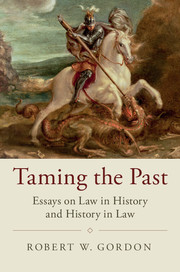Book contents
- Taming the Past
- Studies in Legal History
- Taming the Past
- Copyright page
- Dedication
- Contents
- Foreword
- Permissions
- Introduction
- Part I The Common Law Tradition in Legal Historiography
- 1 The Common Law Tradition in American Legal Historiography*
- 2 Holmes’s Common Law as Legal and Social Science*
- Part II Legal Historians
- Part III History and Historicism in Legal History and Argument
- Index
1 - The Common Law Tradition in American Legal Historiography*
from Part I - The Common Law Tradition in Legal Historiography
Published online by Cambridge University Press: 13 July 2017
- Taming the Past
- Studies in Legal History
- Taming the Past
- Copyright page
- Dedication
- Contents
- Foreword
- Permissions
- Introduction
- Part I The Common Law Tradition in Legal Historiography
- 1 The Common Law Tradition in American Legal Historiography*
- 2 Holmes’s Common Law as Legal and Social Science*
- Part II Legal Historians
- Part III History and Historicism in Legal History and Argument
- Index
Summary
[This essay first appeared in 10 Law & Society Review 9 (1975), as the first part of an introduction to a Festschrift for the Wisconsin social-legal historian James Willard Hurst. Its aim was to sketch the history of American legal historiography before Hurst came on the scene and to explain how Hurst broke with the tradition of largely “internal” legal history. (In this collection, the essay is split into two parts, with the second part on Hurst’s contributions – “James Willard Hurst – Social Legal History’s Pioneer” – in the section on “Legal Historians” that follows this one.) Since this was written several notable works have amplified and added much valuable detail to the account given here – most especially of legal history-writing in the nineteenth century: John Burrow, A Liberal Descent: Victorian Historians and the English Past (1981); Stephen Siegel, “Historism in Late Nineteenth Century Constitutional Thought,” 1990 Wis. L. Rev. 1431; Kunal Parker, Common Law, History and Democracy in America, 1790–1900: Legal Thought Before Modernism (2011); and David M. Rabban, Law’s History: American Legal Thought and the Transatlantic Turn to History (2012).]
- Type
- Chapter
- Information
- Taming the PastEssays on Law in History and History in Law, pp. 17 - 49Publisher: Cambridge University PressPrint publication year: 2017
- 2
- Cited by

